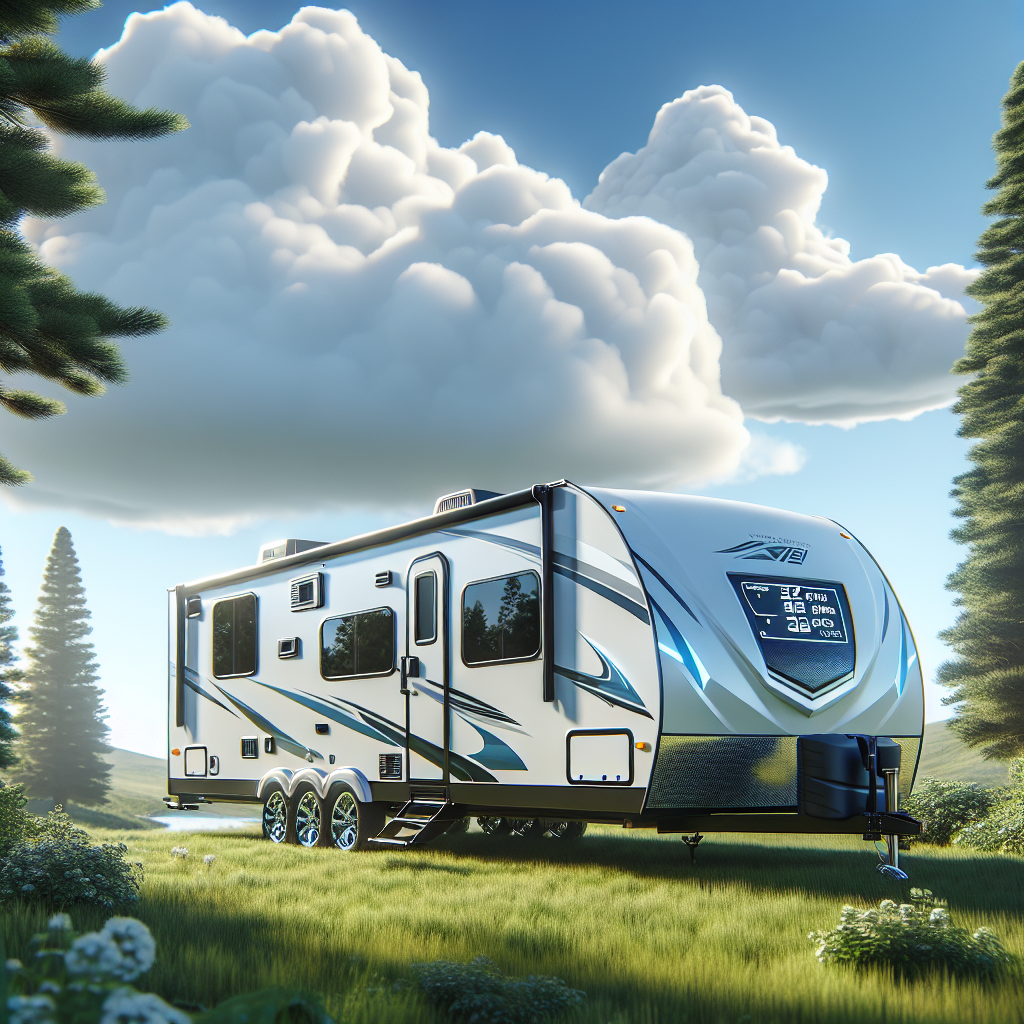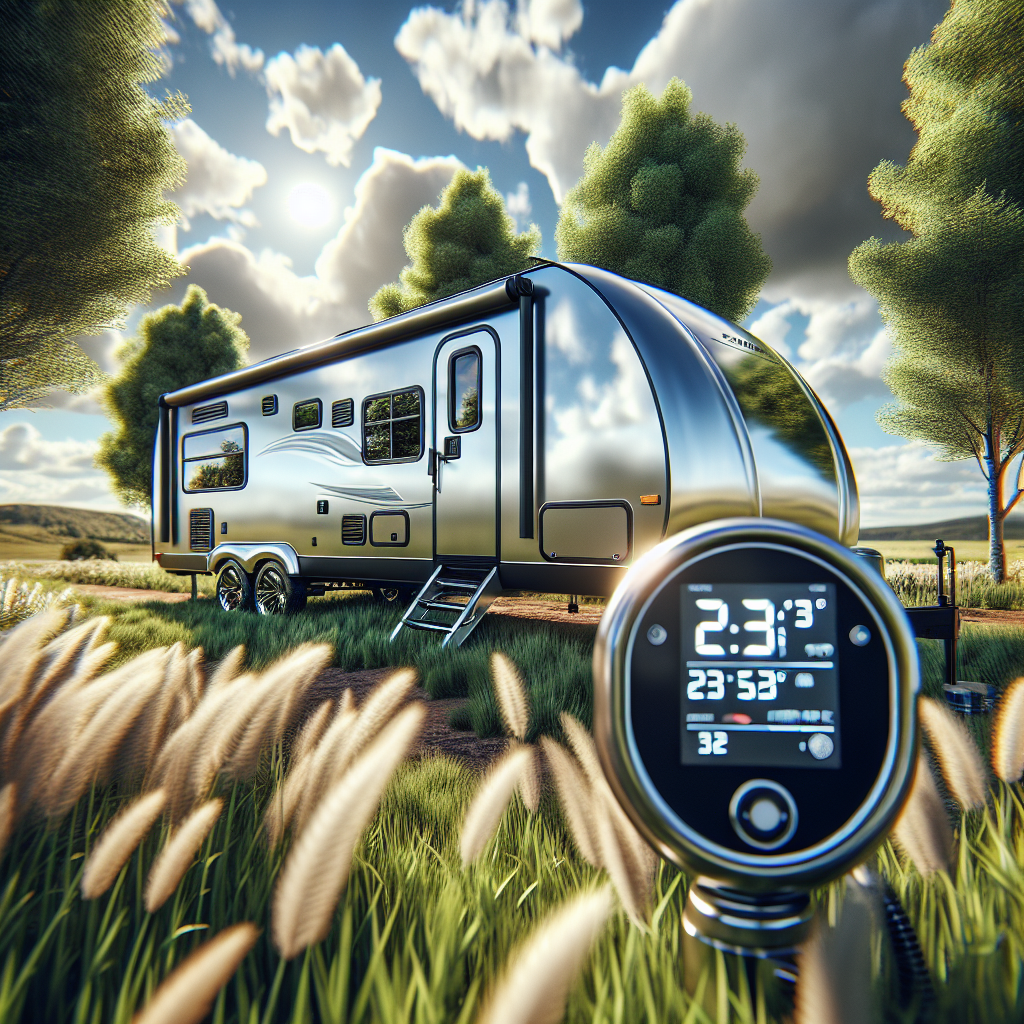When it comes to maintaining your travel trailer, understanding the importance of tire pressure monitoring is crucial for ensuring both safety and performance on the road. Tires are the only point of contact between your vehicle and the ground, and their condition directly affects your trailer's handling, fuel efficiency, and overall longevity.
A travel trailer tire pressure monitoring system (TPMS) plays a vital role in keeping track of tire pressure and temperature. Properly inflated tires not only reduce the risk of blowouts but also enhance fuel efficiency, saving you money in the long run. Here are some key reasons why monitoring tire pressure is essential:
- Safety: Maintaining the right tire pressure significantly lowers the risk of accidents caused by tire failure.
- Performance: Correct tire pressure ensures optimal handling and stability while towing your trailer.
- Longevity: Regular monitoring can extend the lifespan of your tires, preventing premature wear and costly replacements.
By integrating a reliable TPMS into your travel trailer, you can have peace of mind knowing that you are actively safeguarding your journey. Tow with peace of mind, knowing that trailerwatchdog is standing guard.
Key Features of Travel Trailer Tire Pressure Systems

When selecting a travel trailer tire pressure monitoring system (TPMS), understanding its key features can help you choose the best system for your needs. A robust TPMS not only enhances safety but also ensures optimal performance throughout your travels. Here are some essential features to consider:
- Real-Time Monitoring: A quality TPMS provides real-time updates on tire pressure and temperature, allowing you to make informed decisions while on the road.
- Alerts and Notifications: Look for systems that send alerts directly to your smartphone or display screen when tire pressure falls below the recommended levels or if temperatures rise excessively.
- Easy Installation: Choose a system that offers simple installation, allowing you to set it up quickly without needing professional help.
- Durability and Weather Resistance: Since your trailer will be exposed to various weather conditions, opt for a TPMS that is designed to withstand the elements, ensuring longevity and reliability.
- Multiple Tire Monitoring: If your trailer has multiple axles, ensure that the TPMS can monitor all tires simultaneously for comprehensive safety.
These features not only provide peace of mind but also contribute to the overall efficiency and safety of your travel trailer. Investing in a high-quality TPMS is a smart move for any trailer owner committed to safe travels.
How to Properly Install Your Monitoring System

Installing a travel trailer tire pressure monitoring system (TPMS) correctly is crucial for ensuring reliable performance and accurate readings. Follow these steps to achieve a successful installation:
- Read the Manual: Before starting, thoroughly read the manufacturer's manual. This will provide specific instructions and details tailored to your system.
- Gather Your Tools: Ensure you have all necessary tools, such as a wrench, screwdriver, or any other items specified in the manual. Having everything on hand will streamline the process.
- Prepare the Tires: Before installation, check that your tires are clean and free from debris. This helps ensure a good seal when attaching the sensors.
- Attach the Sensors: Most TPMS come with sensors that you’ll need to screw onto the valve stems of each tire. Make sure they are securely fastened but avoid overtightening, which can cause damage.
- Connect the Monitor: Depending on your system, this may involve pairing the monitor with your sensors via Bluetooth or a wired connection. Follow the instructions for your specific model.
- Test the System: After installation, test the system to ensure all sensors are working correctly. Inflate the tires to the recommended pressure and check the monitoring display for accurate readings.
By following these steps, you can ensure that your TPMS is set up correctly, providing you with essential tire data during your travels. Proper installation will help you avoid potential issues and maximize the benefits of your monitoring system.
Best Practices for Maintaining Tire Pressure

Maintaining optimal tire pressure is essential for the safety and performance of your travel trailer. Here are some best practices to help you keep your tire pressure in check:
- Regularly Check Tire Pressure: Make it a habit to check your tire pressure at least once a month, and before any long trips. Use a reliable tire pressure gauge for accurate readings.
- Know Your Recommended Pressure: Familiarize yourself with the manufacturer's recommended tire pressure, which can be found on a sticker inside the driver's door or in the owner's manual. This information is crucial for ensuring that your tires are neither under-inflated nor over-inflated.
- Monitor Temperature Changes: Tire pressure can fluctuate with temperature changes. Be aware that tire pressure decreases in colder weather and may increase in hot conditions. Adjust accordingly to maintain optimal pressure.
- Inspect for Damage: Regularly inspect your tires for any signs of wear, cracks, or punctures. Damaged tires can lead to pressure loss and compromise safety.
- Use a Tire Pressure Monitoring System: Investing in a travel trailer tire pressure monitoring system can provide real-time data on your tire pressures, alerting you to any issues before they become serious problems.
By following these best practices, you can ensure that your tires remain in good condition, enhancing both your safety and the longevity of your travel trailer tires.
Troubleshooting Common Tire Pressure Issues
Understanding common tire pressure issues can help you proactively manage your travel trailer's performance and safety. Here are some typical problems and how to troubleshoot them:
- Low Tire Pressure: If you notice that your tire pressure is consistently low, check for any visible signs of damage or punctures. Additionally, assess if the valve stems are leaking. If the tire is intact, consider re-inflating it to the recommended pressure and monitor it closely for any changes.
- High Tire Pressure: Over-inflation can lead to reduced traction and increased tire wear. If your tires are frequently over-inflated, check your tire pressure gauge for accuracy. It may also be beneficial to adjust your inflation routine based on temperature changes.
- Uneven Tire Wear: If you notice that one tire is wearing more than the others, it could indicate improper inflation, misalignment, or suspension issues. Inspect your trailer’s alignment and consider rotating your tires to promote even wear.
- Warning Lights: If your travel trailer is equipped with a tire pressure monitoring system, pay attention to warning lights. These alerts indicate pressure drops that need immediate attention. Investigate and address any low-pressure warnings promptly.
- Frequent Pressure Loss: If you are experiencing frequent loss of tire pressure, it may be due to a slow leak or a problem with the tire itself. Take your trailer to a professional for a thorough inspection and potential repair.
By being aware of these common tire pressure issues and knowing how to troubleshoot them, you can maintain the safety and efficiency of your travel trailer.
Benefits of Using an Advanced Monitoring System

Implementing an advanced monitoring system for your travel trailer offers numerous benefits that enhance both safety and performance during your journeys. Here are some of the key advantages:
- Real-Time Data: An advanced monitoring system provides real-time data on tire pressure and axle temperatures, allowing you to make informed decisions while on the road. This immediate feedback can prevent potential hazards before they escalate.
- Enhanced Safety: With continuous monitoring, the risk of tire blowouts and catastrophic failures is significantly reduced. You can address issues proactively, ensuring that your trailer remains safe throughout your travels.
- Extended Tire Life: By maintaining optimal tire pressure and monitoring conditions closely, you can enhance the lifespan of your tires. Properly inflated tires experience less wear and tear, leading to fewer replacements and cost savings.
- Improved Fuel Efficiency: Correct tire pressure contributes to better fuel efficiency. When tires are well-maintained, your vehicle uses fuel more efficiently, resulting in savings on gas during long trips.
- Peace of Mind: Knowing that your trailer is equipped with a state-of-the-art monitoring system allows you to focus on enjoying your trip rather than worrying about potential tire issues. You can travel with confidence, knowing that you are safeguarded against unforeseen failures.
To experience these benefits firsthand, tow with peace of mind, knowing that trailerwatchdog is standing guard.








